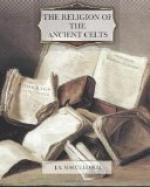Bran, or Bendigeit Vran ("Bran the Blessed"), probably an old pagan title which appropriately enough denotes one who figured later in Christian hagiology, is so huge that no house or ship can hold him. Hence he wades over to Ireland, and as he draws near is thought to be a mountain. This may be an archaic method of expressing his divinity—a gigantic non-natural man like some of the Tuatha Dea and Ossianic heroes. But Bran also appears as the Urdawl Ben, or “Noble Head,” which makes time pass to its bearers like a dream, and when buried protects the land from invasion. Both as a giant squatting on a rock and as a head, Bran is equated by Professor Rh[^y]s with Cernunnos, the squatting god, represented also as a head, and also with the Welsh Urien whose attribute was a raven, the supposed meaning of Bran’s name.[350] He further equates him with Uthr Ben, “Wonderful Head,” the superior bard, harper and piper of a Taliesin poem.[351] Urien, Bran, and Uthr are three forms of a god worshipped by bards, and a “dark” divinity, whose wading over to Ireland signifies crossing to Hades, of which he, like Yama, who first crossed the rapid waters to the land of death, is the ruler.[352] But Bran is not a “dark” god in the sense implied here. Cernunnos is god of a happy underworld, and there is nothing dark or evil in him or in Bran and his congeners. Professor Rh[^y]s’s “dark” divinities are sometimes, in his view, “light” gods, but they cannot be both. The Celtic lords of the dead had no “dark” character, and as gods of fertility they were, so to speak, in league with the sun-god, the slayer of Bran, according to Professor Rh[^y]s’s ingenious theory. And although to distracted Irish secretaries Ireland may be Hades, its introduction into this Mabinogi merely points to the interpretation of a mythico-historic connection between Wales and Ireland. Thus if Bran is Cernunnos, this is because he is a lord of the underworld of fertility, the counterpart of which is the distant Elysium, to which Bran seems rather to belong. Thus, in presence of his head, time passes as a dream in feasting and joy. This is a true Elysian note, and the tabued door of the story is also suggestive of the tabus of Elysium, which when broken rob men of happiness.[353] As to the power of the head in protecting the land, this points to actual custom and belief regarding the relics of the dead and the power of divine images or sculptured heads.[354] The god Bran has become a king and law-giver in the Mabinogion and the Triads,[355] while Geoffrey of Monmouth describes how Belinus and Brennus, in the Welsh version Beli and Bran, dispute the crown of Britain, are reconciled, and finally conquer Gaul and Rome.[356] The mythic Bran is confused with Brennus, leader of the Gauls against Rome in 390 B.C., and Belinus may be the god Belenos, as well as Beli, father of Lludd and Caswallawn. But Bran also figures as a Christian missionary. He is described as hostage at Rome for his son Caradawc, returning thence as preacher of Christianity to the Cymry—a legend arising out of a misunderstanding of his epithet “Blessed” and a confusing of his son with the historic Caractacus.[357] Hence Bran’s family is spoken of as one of the three saintly families of Prydein, and he is ancestor of many saints.[358]




